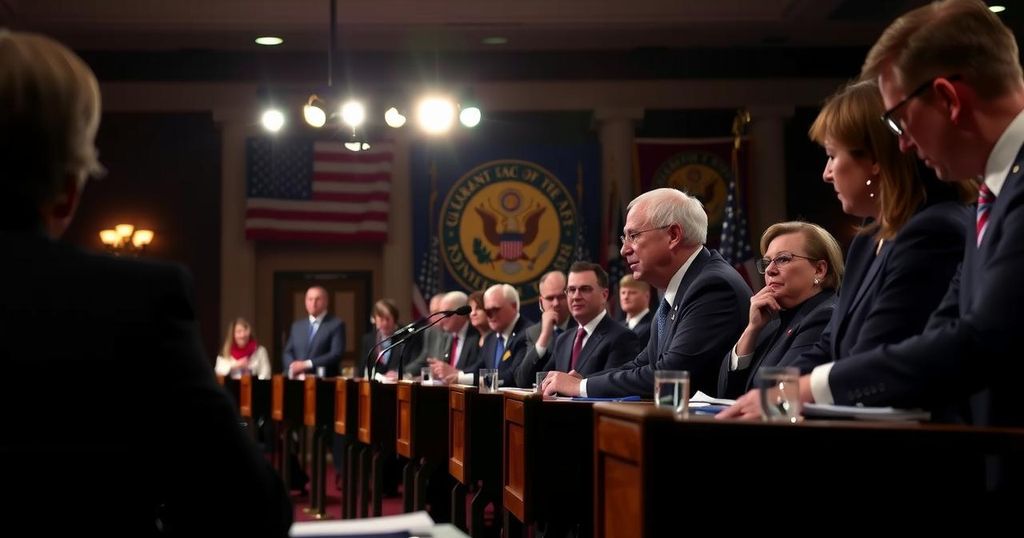Politics
BRAZIL, COLORADO, CONGRESS, CUBA, ELECTION, ELECTION INTEGRITY, FLORIDA, GEN Z, GENERATION Z, HA, HAKEEM JEFFRIES, HOUSE, HOUSE MINORITY, LAUREN UNDERWOOD, LEGISLATION, MICHIGAN, NEGUSE, NEW YORK, NORTH AMERICA, OBAMA ADMINISTRATION, PRESIDENTIAL ELECTION 2024, REPRODUCTIVE RIGHTS, SOUTH AMERICA, TED LIEU, UNITED STATES, WASHINGTON
Leila Ramsay
0 Comments
House Democrats Solidify Leadership Amidst Political Challenges
House Democrats conducted low-key leadership elections, with key leaders like Hakeem Jeffries and Katherine M. Clark remaining unopposed. Debbie Dingell won the most contested race for DPCC chair, defeating Jasmine Crockett. Despite setbacks in recent elections, the party is expected to hold at least 212 seats in the next Congress, showcasing resilience within the leadership and a commitment to modernizing their approach to governance.
House Democrats recently conducted their leadership elections with minimal contention, allowing key figures to retain their positions as they prepare to navigate a Congress under full Republican control. House Minority Leader Hakeem Jeffries, Minority Whip Katherine M. Clark, and Caucus Chairman Pete Aguilar, who stepped into leadership roles two years ago, faced no challengers during the elections held on Tuesday. This outcome enables them to continue guiding the caucus amid significant political challenges following recent electoral defeats. Despite the overall setbacks in national elections, Democrats maintained resilience, with several vulnerable incumbents holding their seats. The party is projected to secure at least 212 seats in the upcoming 119th Congress, with five races still undecided according to The Associated Press. Additionally, Caucus Vice Chairman Ted Lieu and Assistant Democratic Leader Joe Neguse were reelected without opposition, further solidifying the Democratic leadership. The most competitive leadership race occurred for the position of Chair of the Democratic Policy and Communications Committee, which Michigan Representative Debbie Dingell won after defeating Texas Representative Jasmine Crockett. Dingell’s election is noteworthy as she has previously faced significant challenges in her role, while Crockett has gained recognition for her dynamic presence in congressional debates and national events. Dingell’s victory is complemented by the election of Representatives Lauren Underwood, Lori Trahan, and Maxwell Alejandro Frost as co-chairs, with Frost marking his place in history as the first Generation Z member in congressional leadership. Debbie Dingell succeeded her late husband, John Dingell, to represent Michigan and stepped up as DPCC chair this calendar year when Joe Neguse assumed a higher leadership position. Crockett, who has impressed many with her assertive communication style, expressed her motivation to seek the DPCC chair role, citing a desire to modernize and enhance the Democratic Caucus’s ability to connect with constituents effectively, thereby restoring trust in their party values.
The leadership elections within the House Democratic Caucus are typically significant as they set the tone and direction for the party’s legislative strategy. Following substantial electoral losses, the ability of party leaders to navigate a Republican-controlled Congress will be critical. Debates surrounding party leadership often reflect broader struggles with messaging and coalition-building amidst changing voter demographics. The elections held this month showcased not only the continuity of leadership but also the emergence of younger representatives like Maxwell Alejandro Frost, signaling a potential shift in party dynamics going forward. Debbie Dingell’s re-election as chair of the Democratic Policy and Communications Committee highlights the importance of representation and experience in maintaining Democratic priorities. The recent elections reflect the party’s challenges in connecting with the electorate and the need to articulate a compelling narrative. With the looming 119th Congress set to commence, Democratic leaders face the dual task of consolidating their base while also appealing to a broader audience to regain lost influence.
In summary, the recent House Democratic leadership elections demonstrated a preference for continuity amid challenges. With key leaders retaining their positions and the emergence of younger representatives, the caucus aims to navigate the complexities of a Republican-majority Congress. Debbie Dingell’s competitive victory and the unopposed elections for other leaders exemplify the Democratic Party’s strategy to maintain unity while preparing for future electoral battles. As the party strategizes post-election directions, the leadership will be pivotal to restoring trust and relevance among constituents.
Original Source: rollcall.com




Post Comment